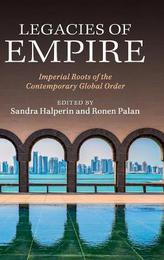
|
Legacies of Empire: Imperial Roots of the Contemporary Global Order
Hardback
Main Details
| Title |
Legacies of Empire: Imperial Roots of the Contemporary Global Order
|
| Authors and Contributors |
Edited by Sandra Halperin
|
|
Edited by Ronen Palan
|
| Physical Properties |
| Format:Hardback | | Pages:268 | | Dimensions(mm): Height 237,Width 157 |
|
| Category/Genre | World history
Colonialism and imperialism |
|---|
| ISBN/Barcode |
9781107109469
|
| Classifications | Dewey:325.32 |
|---|
| Audience | | Professional & Vocational | |
|---|
| Illustrations |
4 Tables, black and white; 1 Halftones, unspecified; 2 Line drawings, unspecified
|
|
Publishing Details |
| Publisher |
Cambridge University Press
|
| Imprint |
Cambridge University Press
|
| Publication Date |
26 November 2015 |
| Publication Country |
United Kingdom
|
Description
The nation-state is a fairly recent historical phenomenon. Human history over the past two to four millennia has been dominated by empires, and the legacies of these empires continues to shape the contemporary world in ways that are not always recognised or fully understood. Much research and writing about European colonial empires has focused on relations between them and their colonies. This book examines the phenomenon of empire from a different perspective. It explores the imprint that imperial institutions, organisational principles, practices, and logics have left on the modern world. It shows that many features of the contemporary world - modern armies, multiculturalism, globalised finance, modern city-states, the United Nations - have been profoundly shaped by past empires. It also applies insights about the impact of past empires to contemporary politics and considers the long-term institutional legacies of the American 'empire'.
Author Biography
Sandra Halperin is Professor of International Relations and co-director of the Centre for Global and Transnational Politics in the Department of Politics and International Relations at Royal Holloway, University of London. She is the author of three cross-regional and trans-historical comparative studies: In the Mirror of the Third World: Capitalist Development in Modern Europe (1997), War and Social Change in Modern Europe: The Great Transformation Revisited (2004) and Re-Envisioning Global Development: A 'Horizontal' Perspective (2013), as well as articles on globalisation, development theory, historical sociology, nationalism, ethnic conflict, Islam, and democracy in the Middle East. Ronen Palan is Professor of International Political Economy at City University London. He has published many articles and books on the subject of the offshore economy and theories of international political economy.
Reviews'This illuminating book examines assemblages of imperial institutions and practices that combine with those of the modern nation-state. Uniformly intriguing and innovative essays illustrate that contemporary world politics is a patchwork of the old and the new. It thus offers imaginative vistas that enrich our sparse theoretical models and open up new areas for research.' Peter J. Katzenstein, Walter S. Carpenter, Jr Professor of International Studies, Cornell University 'The ghosts of dead empires stalk the lands of their successor nations in the form of intermingled populations, financial hubs, trade routes and military infrastructure. The creative contributors to this highly original volume, not content to study only the legacies of empires past, even try to imagine the likely future legacies of the American empire.' Jack Snyder, Robert and Renee Belfer Professor of International Relations, Columbia University 'Sandra Halperin and Ronen Palan have brought together an impressive group of scholars who have demonstrated, across a vast range of time and space from ancient Mongol to the modern United States, just how much the politics of the modern world has evolved in the shadow of the our collective imperial pasts. 'World history', in the editors' own words, 'is imperial history'. This is a book that no person concerned with the present plight of the international order can afford to ignore.' Anthony Pagden, Distinguished Professor, University of California, Los Angeles
|